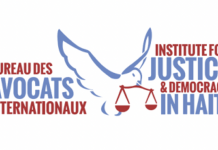@font-face {
font-family: “Cambria Math”;
}p.MsoNormal, li.MsoNormal, div.MsoNormal { margin: 0in 0in 0.0001pt; font-size: 12pt; font-family: “Times New Roman”; }a:link, span.MsoHyperlink { color: blue; text-decoration: underline; }a:visited, span.MsoHyperlinkFollowed { color: purple; text-decoration: underline; }span.WPHyperlink { color: blue; text-decoration: underline; }.MsoChpDefault { font-size: 10pt; }div.WordSection1 { page: WordSection1; }
By: Peter Hallward – HaitiAnalysis
Amy Wilentz’s book *The Rainy Season* (1989) is
widely applauded as the most compelling account of Aristide’s political youth,
and so her judgement of his political legacy carries exceptional weight. The
way history remembers his controversial second presidency (2001-2004) will cast
a shadow over Haiti’s political future for a long time to come, and the ongoing
demonisation of Aristide – in particular by those who like Wilentz once
supported him – contributes directly to the ongoing disempowerment of the
millions of ordinary people who rallied around the Lavalas mobilisation he led.
widely applauded as the most compelling account of Aristide’s political youth,
and so her judgement of his political legacy carries exceptional weight. The
way history remembers his controversial second presidency (2001-2004) will cast
a shadow over Haiti’s political future for a long time to come, and the ongoing
demonisation of Aristide – in particular by those who like Wilentz once
supported him – contributes directly to the ongoing disempowerment of the
millions of ordinary people who rallied around the Lavalas mobilisation he led.
In
this new article, Wilentz writes: “As everyone in Haiti knows, Aristide’s
enemies have, sometimes plausibly, attributed a series of assassinations and
human rights violations to Aristide supporters or to his party or to his
administration or even to the former president himself. It’s assumed that
during the seven years of his South African exile, one thing that kept Aristide
from returning to Haiti was fear of prosecution on such charges. He understands
that his foes would love to see him arrested, jailed and brought before an
unfriendly judiciary.”
this new article, Wilentz writes: “As everyone in Haiti knows, Aristide’s
enemies have, sometimes plausibly, attributed a series of assassinations and
human rights violations to Aristide supporters or to his party or to his
administration or even to the former president himself. It’s assumed that
during the seven years of his South African exile, one thing that kept Aristide
from returning to Haiti was fear of prosecution on such charges. He understands
that his foes would love to see him arrested, jailed and brought before an
unfriendly judiciary.”
Aristide’s
understanding of his many foes, it’s now assumed, thus serves to get the most
prominent among them off the legal hook. According to prosecutor Wilentz, the
return of both Aristide and Duvalier confirms one and the same legal-democratic
deficit. Impunity for one implies impunity for all, and in this sense the
legacy of Haiti’s first democratic leader would amount, perversely, to the
exoneration of dictatorship.
understanding of his many foes, it’s now assumed, thus serves to get the most
prominent among them off the legal hook. According to prosecutor Wilentz, the
return of both Aristide and Duvalier confirms one and the same legal-democratic
deficit. Impunity for one implies impunity for all, and in this sense the
legacy of Haiti’s first democratic leader would amount, perversely, to the
exoneration of dictatorship.
It’s
a neat argument, and a familiar one — but it’s starkly at odds with the facts
of the case, and it contributes to a widespread and disastrous
misrepresentation of history.
a neat argument, and a familiar one — but it’s starkly at odds with the facts
of the case, and it contributes to a widespread and disastrous
misrepresentation of history.
If
Aristide himself really understands things this way, it’s strange that (as
Brian Concannon and many others have pointed out) he seems to have done
everything possible, from the day after the February 2004 coup to his eventual
release from exile seven years later, to return himself to the mercy of those
foes who used every means at their disposal to drive him out of the country. At
least some of these foes, by contrast, soon came to understand the issue
differently: although in 2004 a degree of shameless legal pretence helped misrepresent
the US-backed coup that overthrew him as a restoration of Haitian democracy, a
couple of years later the team of Chicago-based lawyers hired to press some of
the most ‘plausible’ charges against Aristide came to the conclusion that they
were wasting their time, and quietly dropped the case (Jay Weaver, ‘Haiti Drops
Lawsuit Alleging Aristide Theft’, Miami
Herald 6 July 2006). Was this another regrettable case of undemocratic
impunity? Or could it be that those who pretended to indict Aristide, back in
2004-06, were motivated by something other than a concern for justice?
Aristide himself really understands things this way, it’s strange that (as
Brian Concannon and many others have pointed out) he seems to have done
everything possible, from the day after the February 2004 coup to his eventual
release from exile seven years later, to return himself to the mercy of those
foes who used every means at their disposal to drive him out of the country. At
least some of these foes, by contrast, soon came to understand the issue
differently: although in 2004 a degree of shameless legal pretence helped misrepresent
the US-backed coup that overthrew him as a restoration of Haitian democracy, a
couple of years later the team of Chicago-based lawyers hired to press some of
the most ‘plausible’ charges against Aristide came to the conclusion that they
were wasting their time, and quietly dropped the case (Jay Weaver, ‘Haiti Drops
Lawsuit Alleging Aristide Theft’, Miami
Herald 6 July 2006). Was this another regrettable case of undemocratic
impunity? Or could it be that those who pretended to indict Aristide, back in
2004-06, were motivated by something other than a concern for justice?
As
Joe Emersberger points out, in a previous response to Wilentz’s article, if the
persistence of impunity is to serve as a benchmark of democratic legitimacy,
what are we to make of the persistence of impunity for those easily-identified
foes who actually overthrew Haitian democracy, both in 1991 and again (with
arguably yet more calamitous consequences) in 2004? Imagine for a moment what
it might take for George W. Bush, Colin Powell and their associates to face
justice in Haiti. The US account of what happened to Aristide in 2004 is full
of such flagrant falsehoods that refutation is almost a redundant exercise (see
for instance http://www.zcommunications.org/did-he-jump-or-was-he-pushed-by-peter-hallward);
the issue here, ‘it is assumed’, doesn’t so much concern the facts of the case
as the relative power of those who might want to prosecute it.
Joe Emersberger points out, in a previous response to Wilentz’s article, if the
persistence of impunity is to serve as a benchmark of democratic legitimacy,
what are we to make of the persistence of impunity for those easily-identified
foes who actually overthrew Haitian democracy, both in 1991 and again (with
arguably yet more calamitous consequences) in 2004? Imagine for a moment what
it might take for George W. Bush, Colin Powell and their associates to face
justice in Haiti. The US account of what happened to Aristide in 2004 is full
of such flagrant falsehoods that refutation is almost a redundant exercise (see
for instance http://www.zcommunications.org/did-he-jump-or-was-he-pushed-by-peter-hallward);
the issue here, ‘it is assumed’, doesn’t so much concern the facts of the case
as the relative power of those who might want to prosecute it.
More
to the point, presumably Wilentz includes herself among Aristide’s diverse
collection of foes, since in the run-up to that 2004 coup she contributed a
good deal to the representation of Haiti’s most popular political figure as an
illegitimate and ‘uncompromising’ tyrant. (Never mind the rather sobering
number of compromises that Aristide actually made, or was forced to make, from
the start of his first administration to the end of his second, and that demoralised
many of his more committed supporters: references to his supposedly
‘uncompromising’ and intransigent style have always appeared high on the list
of charges against him). In what were to be Aristide’s last months in office, Wilentz
probably did more than any other American journalist to help make murky
attributions of assassination and human rights violations as plausible as
possible. In particular, at a pivotal moment in the run-up to the February 2004
coup, she helped spread rumours, carefully cultivated by some of his other
foes, that Aristide might have approved the assassination of his veteran supporter
Amiot Métayer, in Gonaïves, in September 2003 (see esp. Kevin Pina, ‘The
Ambulance Chasers’, The Black Commentator,
6 November 2003, http://www.blackcommentator.com/63/63_haiti_2.html). Immediate attribution of
responsibility for this gruesome killing to Aristide was one of the key moves
in the elaborate international campaign to discredit him, the campaign that led
directly to the coup and the thousands of further killings it entailed in due
course.
to the point, presumably Wilentz includes herself among Aristide’s diverse
collection of foes, since in the run-up to that 2004 coup she contributed a
good deal to the representation of Haiti’s most popular political figure as an
illegitimate and ‘uncompromising’ tyrant. (Never mind the rather sobering
number of compromises that Aristide actually made, or was forced to make, from
the start of his first administration to the end of his second, and that demoralised
many of his more committed supporters: references to his supposedly
‘uncompromising’ and intransigent style have always appeared high on the list
of charges against him). In what were to be Aristide’s last months in office, Wilentz
probably did more than any other American journalist to help make murky
attributions of assassination and human rights violations as plausible as
possible. In particular, at a pivotal moment in the run-up to the February 2004
coup, she helped spread rumours, carefully cultivated by some of his other
foes, that Aristide might have approved the assassination of his veteran supporter
Amiot Métayer, in Gonaïves, in September 2003 (see esp. Kevin Pina, ‘The
Ambulance Chasers’, The Black Commentator,
6 November 2003, http://www.blackcommentator.com/63/63_haiti_2.html). Immediate attribution of
responsibility for this gruesome killing to Aristide was one of the key moves
in the elaborate international campaign to discredit him, the campaign that led
directly to the coup and the thousands of further killings it entailed in due
course.
On
12 October 2003, for instance, Wilentz published an article in the LA Times
entitled ‘Haiti: A Savior Short on Miracles’, http://articles.latimes.com/print/2003/oct/12/opinion/op-wilentz12).
Although this article stopped short of an explicit endorsement of the
accusation that Aristide was ‘responsible for Métayer’s death’, it did help
lend the idea a degree of ‘plausibility’. After describing the murder and the
reactions it provoked (or was meant to provoke?), Wilentz offered a general
characterisation of the Lavalas government, in terms that would soon be taken
up in a wide variety a media outlets:
12 October 2003, for instance, Wilentz published an article in the LA Times
entitled ‘Haiti: A Savior Short on Miracles’, http://articles.latimes.com/print/2003/oct/12/opinion/op-wilentz12).
Although this article stopped short of an explicit endorsement of the
accusation that Aristide was ‘responsible for Métayer’s death’, it did help
lend the idea a degree of ‘plausibility’. After describing the murder and the
reactions it provoked (or was meant to provoke?), Wilentz offered a general
characterisation of the Lavalas government, in terms that would soon be taken
up in a wide variety a media outlets:
“Aristide permitted and then upheld an
invalid legislative election that gave his party an overwhelming mandate to run
the country, but that also destroyed any hope there was of compromise between
his people and the wealthy Haitians who influence American politicians and
control a good portion of Haiti’s economy. In addition, he foolishly alienated
all the intellectuals and artists and do-gooders who had supported him in his
time of need.
invalid legislative election that gave his party an overwhelming mandate to run
the country, but that also destroyed any hope there was of compromise between
his people and the wealthy Haitians who influence American politicians and
control a good portion of Haiti’s economy. In addition, he foolishly alienated
all the intellectuals and artists and do-gooders who had supported him in his
time of need.
Far
worse things are true: His government has repeatedly failed to apprehend
perpetrators of the grossest human rights abuses, including assassinations of
his former allies and friends and of journalists of all stripes. More
repugnant, a man who embodied the movement against Duvalier and his Tontons
Macoute, or secret police, now has numerous secret armed militias working on
his behalf and spreading terror among the opposition.
worse things are true: His government has repeatedly failed to apprehend
perpetrators of the grossest human rights abuses, including assassinations of
his former allies and friends and of journalists of all stripes. More
repugnant, a man who embodied the movement against Duvalier and his Tontons
Macoute, or secret police, now has numerous secret armed militias working on
his behalf and spreading terror among the opposition.
No
matter who killed Metayer, Aristide has been a bitter disappointment. He is,
however, a master manipulator and a talented political contortionist.”
[ENDQUOTE]
matter who killed Metayer, Aristide has been a bitter disappointment. He is,
however, a master manipulator and a talented political contortionist.”
[ENDQUOTE]
Although this isn’t the place to demonstrate
the point, it certainly required a good deal of talent and contortion to characterise
Aristide’s second presidency in this light (the reference to ‘intellectuals and
do-gooders’ is an especially nice touch), or to attribute Métayer’s still-unsolved
murder to Aristide rather than to those well-connected foes who had every
interest and every opportunity to pin it on him. It could be that Wilentz had
access to information that remains hidden from other observers, in which case
it would be good to know what it is. When I asked Wilentz about this particular
attribution a few years ago, however, she was reluctant to provide further
details, though she did give permission to quote an admission that when she
wrote about “possible Aristide involvement in the killing of Amiot Métayer
I wrote from a great distance (geographical as well as time spent out of the
country), and I think now that I may have been played by certain anti-Aristide
elements” (letter from Wilentz, 25 February 2007, cited in Damming the
Flood, chapter 9, note 10).
the point, it certainly required a good deal of talent and contortion to characterise
Aristide’s second presidency in this light (the reference to ‘intellectuals and
do-gooders’ is an especially nice touch), or to attribute Métayer’s still-unsolved
murder to Aristide rather than to those well-connected foes who had every
interest and every opportunity to pin it on him. It could be that Wilentz had
access to information that remains hidden from other observers, in which case
it would be good to know what it is. When I asked Wilentz about this particular
attribution a few years ago, however, she was reluctant to provide further
details, though she did give permission to quote an admission that when she
wrote about “possible Aristide involvement in the killing of Amiot Métayer
I wrote from a great distance (geographical as well as time spent out of the
country), and I think now that I may have been played by certain anti-Aristide
elements” (letter from Wilentz, 25 February 2007, cited in Damming the
Flood, chapter 9, note 10).
But
rather than correct this possible misrepresentation here, Wilentz’s latest
article in The Nation returns to
another theme long favoured by some of the leading players among Aristide’s
foes, people like former Assistant Secretary of State Roger Noriega – the idea
that “the Aristide regime bore too much of a resemblance to the Duvalier
regime” (Noriega, ‘Haiti at the Crossroads of Democracy’, 14 April 2004, http://www.state.gov/p/wha/rls/rm/31411.htm),
and thus no doubt deserved to be overthrown (and then prosecuted) by fair means
or foul. More sensitive to ‘instinctive’ Haitian sensibilities, Wilentz
suggests we might think of Aristide, Préval and Duvalier as divine triplets who
(to avoid sacrilege?) ‘must be treated equally. If one is punished, all three
must be punished in the same fashion.’
rather than correct this possible misrepresentation here, Wilentz’s latest
article in The Nation returns to
another theme long favoured by some of the leading players among Aristide’s
foes, people like former Assistant Secretary of State Roger Noriega – the idea
that “the Aristide regime bore too much of a resemblance to the Duvalier
regime” (Noriega, ‘Haiti at the Crossroads of Democracy’, 14 April 2004, http://www.state.gov/p/wha/rls/rm/31411.htm),
and thus no doubt deserved to be overthrown (and then prosecuted) by fair means
or foul. More sensitive to ‘instinctive’ Haitian sensibilities, Wilentz
suggests we might think of Aristide, Préval and Duvalier as divine triplets who
(to avoid sacrilege?) ‘must be treated equally. If one is punished, all three
must be punished in the same fashion.’
Equality
is a fine principle. Perhaps on that basis we could start by clarifying the
prosecution’s case. Wilentz notes that “the Duvalier ‘governments’ were
responsible for an estimated 30,000 deaths over almost thirty years.” How
many deaths does she attribute to Aristide’s governments?
is a fine principle. Perhaps on that basis we could start by clarifying the
prosecution’s case. Wilentz notes that “the Duvalier ‘governments’ were
responsible for an estimated 30,000 deaths over almost thirty years.” How
many deaths does she attribute to Aristide’s governments?
Peter Hallward
Kingston University London





